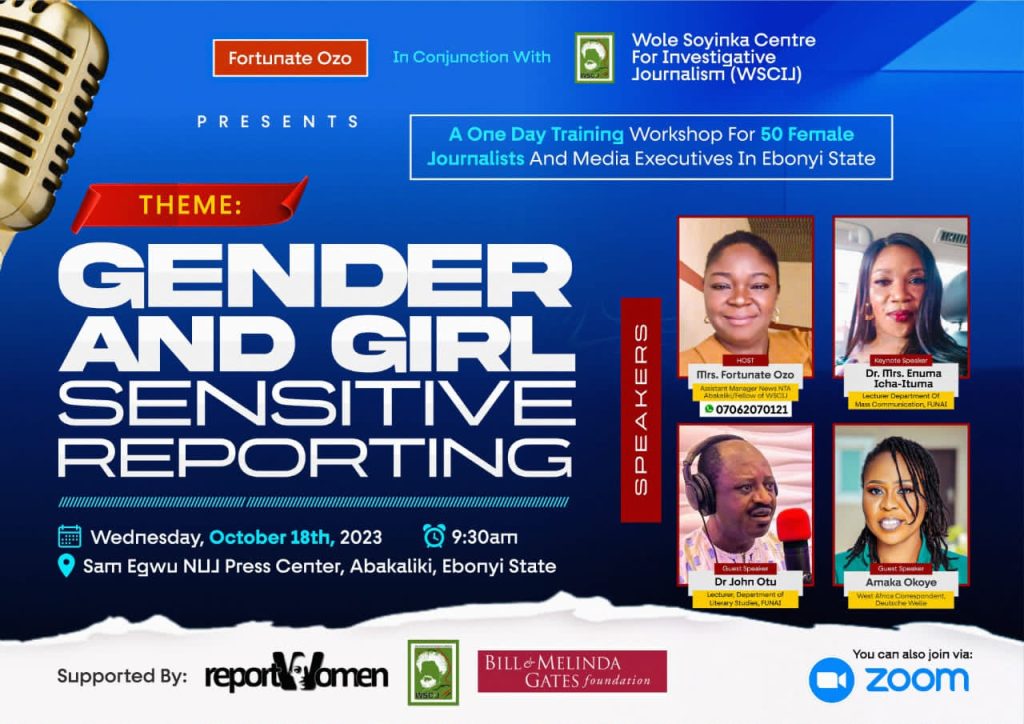Ike Nnachi, Abakaliki
Two University lecturers in Ebonyi State, Dr. John Otu, Dr. Enuma Icha-Ituma and former Chairperson, Nigeria Women Journalists Association (NAWOJ), Mrs. Fortunate Ozo have decried all forms discrimination against women and girls in the society.
The trio observed that stereotype against women and girls in the country was on the steady increase and called on the people to rise against it to ensure gender balance and healthy nation.
Otu, Icha-Ituma and Ozo spoke at Dr. Sam Egwu NUJ Press Centre, Abakaliki during one- day training workshop for 50 female journalists and media executives in the state organised by Fortunate Ozo with support from Wole Soyinka Center For Investigative Journalism ( WSCIJ) with the theme “Gender and Girl Sensitive Reporting.”
In his lecture titled “the role of media executives in engendering gender balance in news and programmes, Dr. John Otu who is a Lecturer in the Department of Literary Studies, Alex Ekwueme Federal University Ndufu Alike Ikwo (AE-FUNAI) in the state, called on media organisations to ensure gender balance in their media houses.
He implored female journalists to rise against all forms of stereotype against women and the girl child by projecting women in limelight through their reportage.
Otu who is a former Commissioner for Information in the state, stressed the need for the female child to be socialised and educated in the society, adding that a socialised woman cannot be pushed down in the society.
“Socialisation of the female child is very important in the society. Socialise the female child, let her know her environment, let her know what she can do and what she cannot do, give her opportunities to be bold and courageous. If a women is empowered academically, you can’t intimidate her, you can’t push her down,” he stated.
In her own lecture titled “Gender/Girl Sensitive Reporting, Dr. Icha-Ituma who is a Lecturer in the Department of Mass Communication, Ebonyi State University (EBSU), decried sexualisation of women in the media and the society and called for an end to it.
She called on female journalists to rise to the occasion by focusing on how to investigate cases of abuse against women in the society.
She said “women and girls are frequently sexualised in the media. Female reporters can use their platforms to change the narrative. Before we publish things in the media about women, we should make sure we protect women and girls
“When you listen to some of our music these days, you will see the artist demeaning and dehumanising women. I listen to one of the artists popularly known as Flavour where he was singing ‘ara dara ada, adago’ meaning a breast that has fallen, has fallen and some women are dancing to that. How will he be singing all those things about women? So, what have women journalists been doing about it? We should counter that, we should try to un-stereotype that. What does he mean by that and some people tend to believe and enjoy that. Why should he continue to dehumanise women and demean them because you are singing song?
“In the family, women are being portrayed as mothers with their works tied to their benefit to have children and care for the family. As reporting for action for a female journalist, we need to highlight the complexity of motherhood. Media should discontinue the narrative that women should be dedicated to only child bearing and rearing.
“Gender and Girls sensitive reporting is not merely a professional obligation but a societal imperative. All women must come together lets put all hands on deck and make sure we project the women, amplify their voices, dismantle all these stereotypes against women and project women in limelight.”
In her address, Mrs Fortunate Ozo, Assistant Manager News NTA Abakaliki/Fellow of the Report Women, Female Reporter’s leadership programme of the Wole Soyinka Center for Investigative Journalism ( WSCIJ) said the training was designed to meet the needs of female journalists and provide them with the requisite knowledge and skills that will reposition them to churn out gender balanced and inclusive reports and programmes in their newsrooms.
According to her, the theme of the workshop “Gender/ Girl Sensitive Reporting was informed by the growing need to carry every human being along in our news reports and programmes amidst the high level of societal stereotypes limiting especially women and children from receiving the desired visibility.

